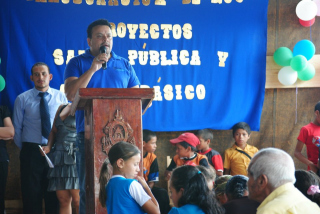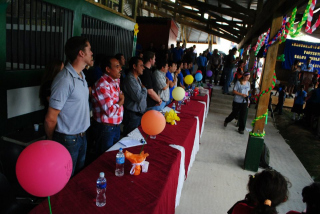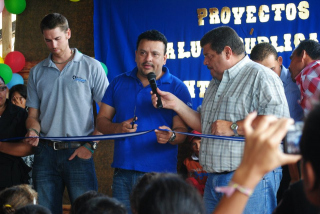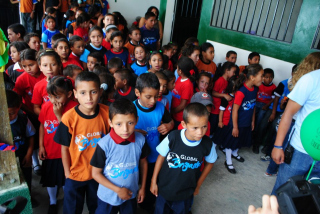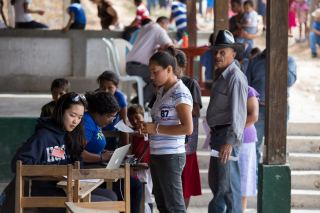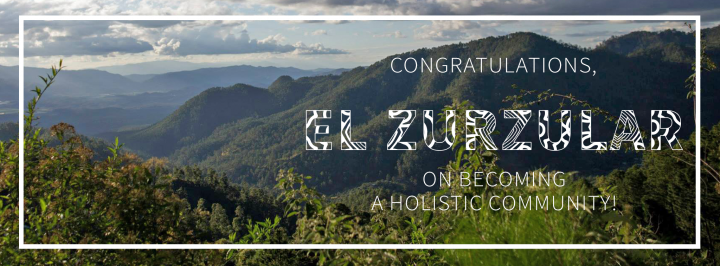
Fast Facts
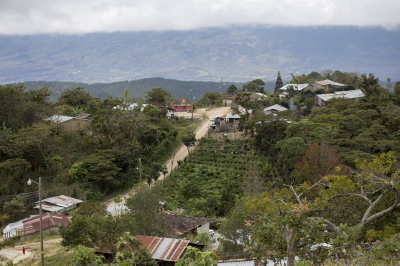
| Population* | 600 |
| Number of Homes | 100 |
| Primary Occupation |
Coffee, Corn, and Bean Harvesting |
| Electricity | Yes |
| Nearest Health Center | In Zurzular |
| Community Health Workers | Yes |
| Water System | Yes |
| Community Bank | Yes |
| Homes with Latrines | 90% |
| Distance from Compounds | 1 hour 30 min |
* Population does not reflect how many patients will be seen on medical
brigades as many people from surrounding communities come seeking
medical attention during brigades.
Top Three Needs Expressed: El Zurzular and Global Brigades are proud to say that through holistic programming, the top health and economic needs of the community have been covered. El Zurzular also has proven strong leadership and capitalized funds in their community bank in order to address any needs that arise in the future.
Geography
Municipality: San Juan de Flores
Department: Francisco Morazán
GPS Coordinates: N 14° 15.762' W 086° 52.227'

Education
El Zurzular’s educational system includes kindergarten and primary schools until 6th grade. There are about 120 students under the direction of Betsabe Yanalie Velasquez. It is approximated that about 60% of the community knows how to read and write. The school director commented that there are a several young people who graduated 6th grade but haven’t been able to master reading and writing, and would benefit from further education if it were possible.
Architecture Project in El Zurzular
Like many other rural communities, El Zurzular and the surrounding communities did not have a secondary school. Thus, students who wished to continue their education beyond sixth grade needed to walk approximately three hours to the school in Cantarranas. Recognizing the need for a secondary school, Global Brigades program lead John Cunningham designed a school and construction began promptly thanks to a $20,000 donation from DePaul University, Dan Parillo, and his family. Construction began in October 2010 and the first student brigades arrived in December of the same year.
Thanks to numerous successful brigades, the Architecture Brigades Program and student volunteers finished the secondary school in the community of El Zurzular and exited the community in January of 2012. Global Brigades Architecture Brigades and staff members worked with community members to:
• Train community members in useful construction techniques that they will be able to apply to various architectural projects in the community
• Construct a large school with three classrooms, a computer room, and seven latrines
• Install solar electricity
• Conduct 15 educational workshops emphasizing important mathematical and architectural skills
in local primary schools
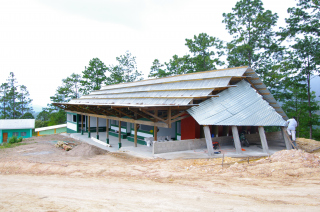
Exiting the community signifies that the program will no longer be bringing brigades to this community and will gradually lessen follow-up to one visit every 6 months-1 year. The Architecture Brigades program trusts that the community members will maintain the secondary school with the assistance of the trained masons and understand the importance of facility upkeep.
Health Care Access in El Zurzular
El Zurzular is a community located high in the mountains near the municipality of Cantarranas in Fransico Morazan. Due to its remote location, El Zurzular has a smaller health center called a CESAR. CESAR's never have doctors on staff and typically have one nurse. The nurse staffs the health center Monday through Friday traveling from her home in Cofradia, about a 45 minute drive. The health center is open from about 7am to 3pm. Therefore, their access to healthcare is very limited, not even being able to get care on weekends and not having access to doctors. If they need to see a doctor or dentist, they must travel the mountainous terrain to Cantarranas, the nearest town with a CESAMO, or a larger scale health center where doctors and occassionally dentists are on staff. The trip can take up to 4 hours on foot. Although there is a bus that comes to the community, it does not come very often and costs money that many community members cannot afford.
| Average Number of Patients | 636 |
| Surrounding Communities |
El Chaguite, Palo Verde, La Union, Las Delicias, Buena Vista, Nueva Esperanza |
| Common Illnesses |
Respiratory, Gastrointestinal, and Common Cold |
| Nearest Health Center | In Zurzular |
| Community Health Workers | Yes |
Brigade Site Information
As the health center is located next to the local school, both facilities are used to hold a medical brigade. The school is relatively small, with about 2 large rooms and 2 smaller roomes. Despite the smaller space, we always run a successful brigade. Doctors spend an average of 10 minutes with each patient and we are able to provide 4-5 educational charlas a day. Each brigade sees an average of 210 patients per day.
Current Status
This community currently receives brigades approximately every year.
To understand more about how Global Brigades can partner with this community to make an impact, read about what it's like to experience a Medical Brigade.
Dental Program in El Zurzular
In working closely with the medical program, the dental program provides fillings, extractions, and fluoride treatments as a standard part of medical brigades. Most community members do not have regular access to dental care due to the lack of dentist within a reasonable distance.
Fast Facts
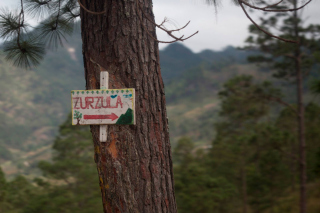
| Average Number of Adult Patients | 87 |
| Average Number of Extractions | 109 |
| Average Number of Fillings | 49 |
| Average Number of Sealants | 15 |
| Average Number of Child Patients | 119 |
To understand more about how Global Brigades can partner with this community to make an impact, read about what it's like to experience a Dental Brigade.
Engineering Program in El Zurzular
The Engineering Program works in conjunction with the Water Program to ensure water projects are maintained and economically sustainable. Please reference the water tab for details on El Zurzular's completed water project.
Water Project Overview

| Number of Beneficiaries | 520 |
| Water System Type | Gravity |
|
Projected Project Cost |
$9,900 |
| Meters of Pipes Needed | 9km |
| Storage Tank Volume | 5,000 Gallons |
Current Status
El Zurzular’s water system is functioning very well. Flow rates at the tank and faucets are excellent. The Water Council is properly administrating the project. The one issue identified is the lack of chlorination in coffee season, a problem that Water Brigades is working with community leaders to fix.
To understand more about how Global Brigades can partner with this community to make an impact, read about what it's like to experience an Engineering Brigade.
El Zurzular's Water Challenge
A community gravity water system had been built in 1985 by the government in El Zurzular. At the time the system was designed to provide water for only 30 homes and in June 2009 was only connected to 54 of the 87 homes in the community. Those people without a water connection were using water from streams and springs nearby which they carried to their homes in buckets other plastic containers. Due to small piping diameters and a lack of control and cleaning valves in the system, only 12 gallons/minute was entering the storage tank, an insufficient quantity for the population.
Water Project Overview
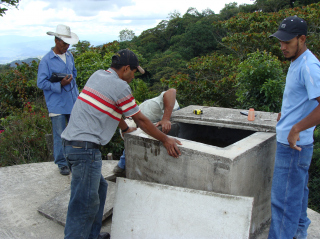
| Number of Beneficiaries | 520 |
| System Type | Gravity |
|
Projected Project Cost |
$9,900 |
| Meters of Piping Needed | 9 km |
| Storage Tank Volume | 5,000 Gallons |
El Zurzular's Water Solution
Water Brigaders from four different universities worked in El ZurzularHonduras Water Zurzular between August and December 2009. During that time, those volunteers worked with community members to:
• Install a filter and control valve at the water source.
• Replace all piping in the conduction line with larger diameter pipes and cleaning and air valves.
• Repair the chlorination system at the storage tank.
• Construct an entirely new distribution network.
• Install water connections at all previously unconnected homes.
• Provide educational seminars to children in the community on water and health related topics.
To ensure the sustainability of the project, a new seven member Water Council was established and trained by Water Brigades in addition to a Basic Sanitation Committee also trained by Water Brigades.
El Zurzular was the first full scale water system completed by Water Brigades and was a great success. Community participation was incredible with over 90 community members working on the project every day. Once completed 38 gallons/minute enter the storage tank, 100% of the homes in the community are connected to the water system, and zero cases of diarrhea in children under 5 years old were reported in the first 6 months after the completion of the project.
Current Status
Completed: 2009
El Zurzular’s water system is functioning very well. Flow rates at the tank and faucets are excellent. The Water Council is properly administrating the project. The one issue identified is the lack of chlorination in coffee season, a problem that Water Brigades is working with community leaders to fix.
To understand more about the importance of a functioning water system and how Global Brigades can help, read about what it's like to experience a Water Brigade.
The Public Health Challenge in Community
Many community mambers in El Zurzular lacked the resources needed to improve their homes and prevent diseases caused by unsafe living conditions. The majority of homes were made of adobe, straw, and mud and very few homes had hygiene stations, cement floors, and eco-stoves prior to the arrival of Global Brigades. Such living conditions triggered disease. The lack of hygiene stations led to high rates of diarrhea and water-borne disease, the absence of cement floors caused parasitic infection and Chagas Disease, and the lack of eco-stoves resulted in respiratory problems in many community members.
Public Health Project Overview

| Number of Beneficiaries | 520 |
| Latrines | 85 |
|
Stoves |
84 |
| Floors | 191 |
| Water Storage Units (Pilas) | 66 |
| Community Health Workers | 11 |
The Public Health Solution in El Zurzular
Public Health Brigaders from several different universities and the Public Health Brigades in-country team worked in El Zurzular from December 2010 – September 2011. During this time, volunteers and staff members will work with community members to: identify community leaders and train them to form the Basic Sanitation Committee, increase cultural sensitivity and awareness by working side-by-side with qualified masons and project beneficiaries, build 84 eco-stoves, 85 litrines, 66 water storage units, and 191 cement floors, conduct educational workshops emphasizing the importance of sanitation and hygiene in the local primary school.
To ensure the sustainability of the in-home infrastructure projects, the Public Health Program provides continuous follow-up in the community. It also forms and trains the Basic Sanitation Committee, a community body formed by local leaders which monitors the correct usageand maintenance of the new infrastructure. Clear responsibilities and powers are assigned to each member, making the beneficiaries themselves an even stronger stakeholder in the Public Health projects.
Community Health Workers in El Zurzular
The Community Health Worker (CHW) Program in El Zurzular began in 2012 after the water, public health, and microfinance programs had already completed their projects in the community. The Community Health Workers help to provide basic medical attention in the absence of the nurse in the Community Health Center. CHWs help to treat and prevent common illnesses and address other health topics such as first aid, caring for pregnancies, and first response in emergency situations. There are a total of 11 CHWs currently working in El Zurzular. El Zurzular is a part of a larger area that includes 4 smaller communities, with El Zurzular being the centralized location. Therefore, these 11 Community Health Workers reach 4 different communities. The Community Health Workers help to provide basic medical attention in the absence of the nurse in the Community Health Center.
Current Status
Completed: April 2011
After numerous successful brigades, the Public Health Brigades Program exited the community of El Zurzular. Exiting the community signifies that the program no longer be brings brigades to this community and will gradually lessen follow-up to one visit every 6 months-1 year. The Public Health Brigades program trusts that the community members will maintain their projects with the assistance of the trained masons and understand the importance of building safe living environments whenever they construct new homes.
To understand more about the importance of these public health projects and how Global Brigades can help, read about what it's like to experience a Public Health Brigade.
El Zurzular's Economic Challenge

El Zurzular was Global Brigades Honduras’ first holistic community. The success of their community bank, Juventud Unida, and microenterprise has inspired the creation of new community banks and leaders in surrounding communities. The bank has provided all community members access to loans. In 2015 alone, the bank granted over $210,000 lempiras (approximately $9,200 USD) in emergency and agriculture loans. Access to loans has especially
provided aid to coffee growers who lost their crops due to the coffee rust. Agriculture loans allow community members the capital needed to buy fertilizer and pesticides. In addition to growing coffee, El Zurzular grows corn and beans for sustenance. The average income in El Zurzular is $3,500 lempiras a month; although, income is earned seasonally. Services such as savings education provided by the community bank and brigaders has aided community member manage their income and repayment plans.
Community Bank Overview
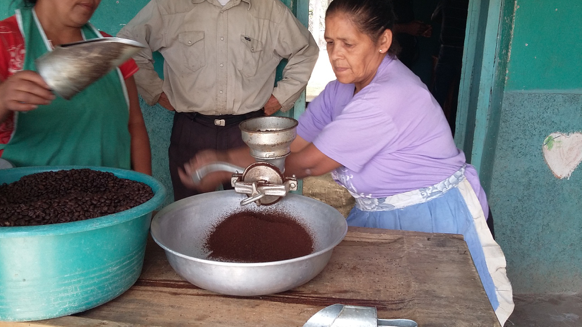
| Establishment Date | 2010 |
| Number of Members | 32 |
|
Services |
Credits and Savings |
| Microenterprise | Coffee Enterprise |
| Number of Beneficiaries | 520 |
El Zurzular's Business and Microfinance Solution
El Zurzular is a community of coffee growers who have developed best practices and techniques. Global Brigades has partnered with community leaders to create El Zurzular’s coffee cooperative. El Zurzular sells their coffee in two ways; one, by selling dry coffee to domestic partners such as Santa Rosa de Copan; and two, by selling roasted coffee to students on brigade in Honduras. In 2015, the microenterprise leaders earned 100,000 lempiras (around $4300 USD) on roasted coffee and 800,000 lempiras or over $35,000 USD on their dried coffee sales.
El Zurzular has been able to expand their business thanks to their investments such as a delivery truck. One of the biggest challenges faced by El Zurzular was the inability to transport their coffee, making them rely on “coyotes” who would use their transportation advantage to charge unfair prices. El Zurzular now pays for a delivery service at a low and affordable price. Other investment made by the business include:
- Six solar dryer - Scale Hygrometer
- Wet Mill - Labels
- Manual Roaster - Washer
- Scale Hygrometer - Manual Dehusker
Cafe Holistico
El Zurzular is the pilot community in Honduras of Global Brigades' new iniative Cafe Holistico. Global Brigades is helping coffee growers expand their business, increase coffee quality, and find profitable markets. Communities like El Zurzular now have the opportunities to sell dry beans to Cafe Holistico. These beans are then roasted and packaged by GB partners. The final project is sold by Global Brigade's volunteers as a fundraiser.
If you would like to learn more about Cafe Holistico or help support, please visit holistico.org.
El Zurzular's Inauguration
El Zurzular was officially inaugurated as a holistic community in 2011. After working with Global Brigades staff and volunteers, the community has established strong leadership in continuing both health and development initiatives in their community. El Zurzular has a newly constructed community health center with staff, community health workers, a basic sanitation committee, a community bank, and a strong microenterprise. Below are some photos from the inauguration.
